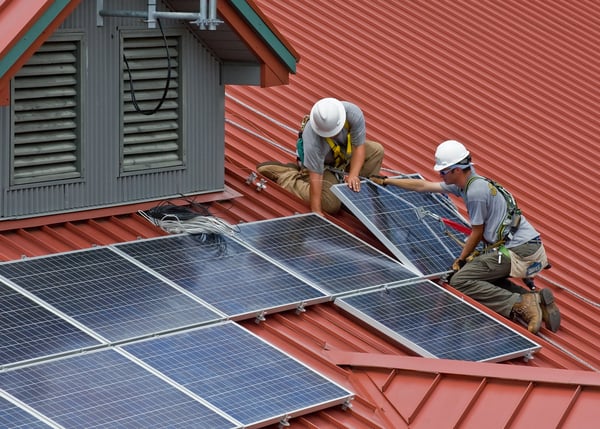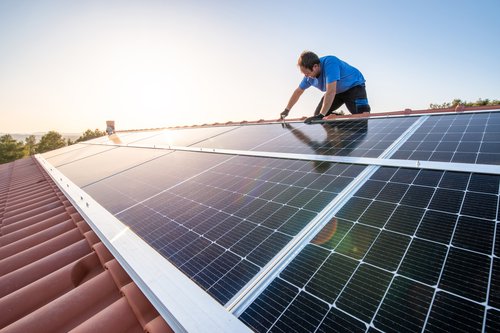The Best Solar Panels for Business: High-Quality and Budget-Friendly Power Solutions
The Best Solar Panels for Business: High-Quality and Budget-Friendly Power Solutions
Blog Article
Just How to Pick the Right Solar Energy Installment for Your Power Demands
Choosing a proper solar power installation calls for a methodical approach that begins with a clear understanding of your energy consumption patterns and expected future needs. Aspects such as the kind of solar innovation, installation prices, and offered rewards play essential roles in making a notified choice.
Assess Your Energy Requirements
Assessing your energy requires is a vital very first step in the solar power installment process. Understanding your current and future power intake will assist the design of an effective planetary system customized to your requirements. Begin by examining your energy bills from the past year to identify your average monthly energy usage, commonly measured in kilowatt-hours (kWh) This information will give a structure for calculating the size of the planetary system you may need.
Think about seasonal variations in energy consumption, as certain months may demand even more power due to heating or air conditioning needs. Additionally, review any kind of scheduled adjustments in lifestyle or building, such as the acquisition of electrical automobiles or home growths, which might enhance your energy demands in the future.
As soon as you have a thorough understanding of your power consumption, you can determine the ideal solar ability needed to fulfill those needs. This evaluation not only helps in sizing the solar setup however likewise informs choices concerning energy storage space solutions and possible grid connection requirements. solar photovoltaic. Inevitably, accurately determining your power needs makes sure that your solar energy system runs efficiently, supplying the advantages of sustainable power abreast with your intake patterns

Evaluate Solar Technology Options
When considering a solar power installment, it is necessary to assess the various solar technology alternatives offered to ensure the system straightens with your power requirements and budget. The key technologies consist of monocrystalline, polycrystalline, and thin-film photovoltaic panels, each offering unique advantages and downsides.
Monocrystalline panels are known for their high effectiveness and efficiency in restricted room, making them suitable for property installments with less roofing system location. Thin-film solar panels are light-weight and flexible, suitable for unusual surfaces, but they usually have reduced performance and require even more area to generate the same energy outcome.
In addition to panel kinds, take into consideration solar inverters, which convert the direct present generated by the panels right into rotating current for home use. String inverters, microinverters, and power optimizers each have distinct benefits that can affect system performance. Assessing these choices will certainly assist you make an educated decision that meets your energy requirements efficiently.
Think About Setup Prices
Recognizing installment prices is crucial for anyone thinking about a solar energy system. These expenses can vary considerably based on a number of variables, consisting of system dimension, kind of panels, and installation intricacy. A normal property solar setup may vary from $15,000 to $30,000 prior to incentives, which can be a significant ahead of time financial investment.
To properly examine installment expenses, it is necessary to get detailed quotes from numerous solar providers. These quotes ought to damage down the expenses of equipment, labor, allows, and any type of additional accessories needed for the installation. Pay very close attention to the top quality of materials being used, as higher-quality panels and inverters can cause much better efficiency and long life, potentially countering higher initial prices.
Furthermore, consider the long-lasting effects of installment expenses. A less expensive installment might conserve cash ahead of time but might lead to greater maintenance costs or lowered energy manufacturing over time. It is likewise advisable to examine funding options, such as solar loans or leases, which can impact your total financial commitment.
Study Resident Rewards
Exploring local motivations can substantially influence the overall expense of a solar energy installment. Lots of regions supply a range of financial motivations focused on promoting renewable power usage, making other solar energy a lot more available and affordable for property owners and businesses alike.
These motivations may consist of federal tax debts, state refunds, and local energy company programs that supply cash money motivations or web metering alternatives. The Federal Investment Tax Credit (ITC) enables you to subtract a significant percentage of your solar setup prices from your federal taxes. State-specific motivations can better enhance these cost savings, often in the form of direct cash discounts or tax debts.
Additionally, some city governments might use residential or commercial property tax exceptions for solar installments, ensuring that your financial investment does not increase your real estate tax obligation. Looking into these motivations can uncover significant financial savings, which can affect your choice on the dimension and kind of planetary system to install.

Choose a Credible Installer
Selecting a reliable installer is critical to making certain the success and durability of your solar power system. The installation procedure substantially impacts the performance and efficiency of your solar panels, making it essential to pick a specialist with a proven track document.
Next, confirm the installer's qualifications, including licenses, qualifications, and insurance coverage. A trusted installer should hold qualifications from recognized companies, such as the North American Board of Certified Power Practitioners (NABCEP), Discover More showing a high level of experience. In addition, ask about the installer's experience with comparable projects, specifically in your area, as local climate and policies can affect installation methods.
Demand multiple quotes and contrast them not only on rate however additionally on the quality of devices and service warranties used. A credible installer needs to provide transparent details about their services and products, assisting you make an educated choice. By investing time in i loved this choosing a trustworthy installer, you will improve the overall effectiveness and durability of your solar power system.
Final Thought
Finally, picking the appropriate solar power installation necessitates an extensive analysis of power needs, an understanding of available solar innovations, and a careful consideration of setup expenses. Examining regional rewards can enhance economic advantages, while picking a reputable installer ensures quality workmanship and reliability. solar photovoltaic. By carefully analyzing these variables, people can accomplish an ideal solar service that meets both existing and future energy demands, inevitably adding to sustainable energy methods and expense savings with time
Report this page